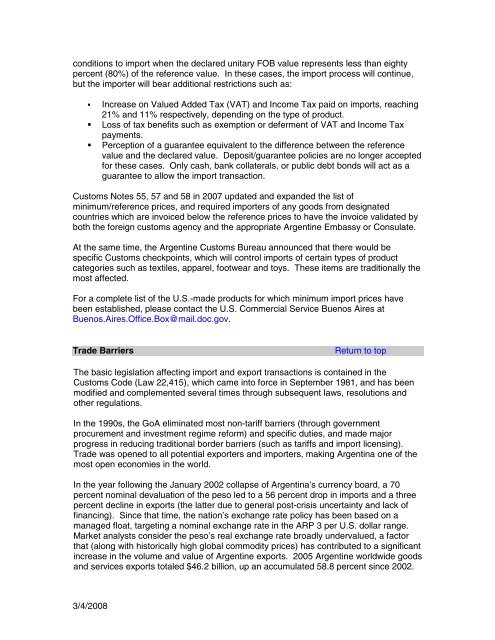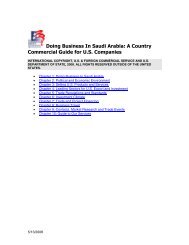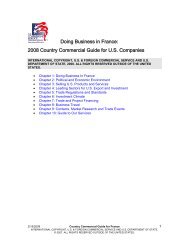Create successful ePaper yourself
Turn your PDF publications into a flip-book with our unique Google optimized e-Paper software.
conditions to import when the declared unitary FOB value represents less than eighty<br />
percent (80%) of the reference value. <strong>In</strong> these cases, the import process will continue,<br />
but the importer will bear additional restrictions such as:<br />
3/4/2008<br />
<strong>In</strong>crease on Valued Added Tax (VAT) and <strong>In</strong>come Tax paid on imports, reaching<br />
21% and 11% respectively, depending on the type of product.<br />
Loss of tax benefits such as exemption or deferment of VAT and <strong>In</strong>come Tax<br />
payments.<br />
Perception of a guarantee equivalent to the difference between the reference<br />
value and the declared value. Deposit/guarantee policies are no longer accepted<br />
for these cases. Only cash, bank collaterals, or public debt bonds will act as a<br />
guarantee to allow the import transaction.<br />
Customs Notes 55, 57 and 58 in 2007 updated and expanded the list of<br />
minimum/reference prices, and required importers of any goods from designated<br />
countries which are invoiced below the reference prices to have the invoice validated by<br />
both the foreign customs agency and the appropriate Argentine Embassy or Consulate.<br />
At the same time, the Argentine Customs Bureau announced that there would be<br />
specific Customs checkpoints, which will control imports of certain types of product<br />
categories such as textiles, apparel, footwear and toys. These items are traditionally the<br />
most affected.<br />
For a complete list of the U.S.-made products for which minimum import prices have<br />
been established, please contact the U.S. Commercial Service Buenos Aires at<br />
Buenos.Aires.Office.Box@mail.doc.gov.<br />
Trade Barriers Return to top<br />
The basic legislation affecting import and export transactions is contained in the<br />
Customs Code (Law 22,415), which came into force in September 1981, and has been<br />
modified and complemented several times through subsequent laws, resolutions and<br />
other regulations.<br />
<strong>In</strong> the 1990s, the GoA eliminated most non-tariff barriers (through government<br />
procurement and investment regime reform) and specific duties, and made major<br />
progress in reducing traditional border barriers (such as tariffs and import licensing).<br />
Trade was opened to all potential exporters and importers, making <strong>Argentina</strong> one of the<br />
most open economies in the world.<br />
<strong>In</strong> the year following the January 2002 collapse of <strong>Argentina</strong>’s currency board, a 70<br />
percent nominal devaluation of the peso led to a 56 percent drop in imports and a three<br />
percent decline in exports (the latter due to general post-crisis uncertainty and lack of<br />
financing). Since that time, the nation’s exchange rate policy has been based on a<br />
managed float, targeting a nominal exchange rate in the ARP 3 per U.S. dollar range.<br />
Market analysts consider the peso’s real exchange rate broadly undervalued, a factor<br />
that (along with historically high global commodity prices) has contributed to a significant<br />
increase in the volume and value of Argentine exports. 2005 Argentine worldwide goods<br />
and services exports totaled $46.2 billion, up an accumulated 58.8 percent since 2002.












